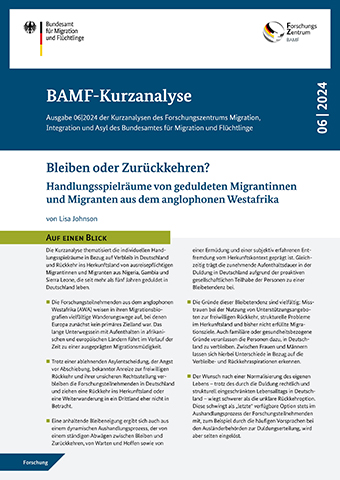Stay or return? , , Scope of action for tolerated migrants from Anglophone West Africa
 Source: © BAMF
Source: © BAMF
The BAMF Brief Analysis 06|2024 examines the scope of action for tolerated migrants from the Anglophone West African countries Nigeria, Gambia and Sierra Leone who have been living in Germany for over five years despite rejected asylum applications and the threat of deportation.
Based on ethnographic data and qualitative interviews, the analysis offers deeper insights into these individuals' decision-making processes and living conditions.
An overview of the most important findings
Migration biographies and fatigue
The migrants interviewed have often undergone lengthy and traumatic migration experiences across African and European countries. These experiences lead to a pronounced "migration fatigue", which reinforces the need for stability and a "normal" life in Germany as opposed to a potential return to the country of origin.
Decision-making dynamics – inclination to stay vs. return
Despite the existence of return assistance programs, there are pronounced reservations against voluntary return. A major reason for the tendency to stay is the increasing loss of connection to the country of origin, reinforced by the long absence and negative reports about the difficult living conditions of returnees. Many interviewees fear stigmatization and limited economic prospects in their country of origin.
Importance of social participation and language acquisition
The opportunity to participate in society, social contacts and the acquisition of the German language contribute significantly to staying there. People who have access to social support and employment or are integrated through language courses and networks are more likely to stay in Germany.
Influence of the Opportunity Residence Act
The introduction of the Opportunity Residence Act ("Chancen-Aufenthaltsrecht") raises hopes among long-term tolerated migrants of obtaining permanent residence status. For some respondents, this offers a new prospect of legal security and social integration, which further strengthens their inclination to stay.
The analysis shows that voluntary return becomes an increasingly implausible option for the interviewees over time due to structural, social and personal constraints. The insights gained here can contribute to adapting existing consultation services more closely to the specific needs of such target groups, particularly through culturally adequate and trust-building measures. Targeted advice and support networks could be valuable resources for creating long-term solutions in terms of both residence law and return assistance.
The Brief Analysis was written by: Dr. Lisa Johnson
The Brief Analysis is only available in German.
